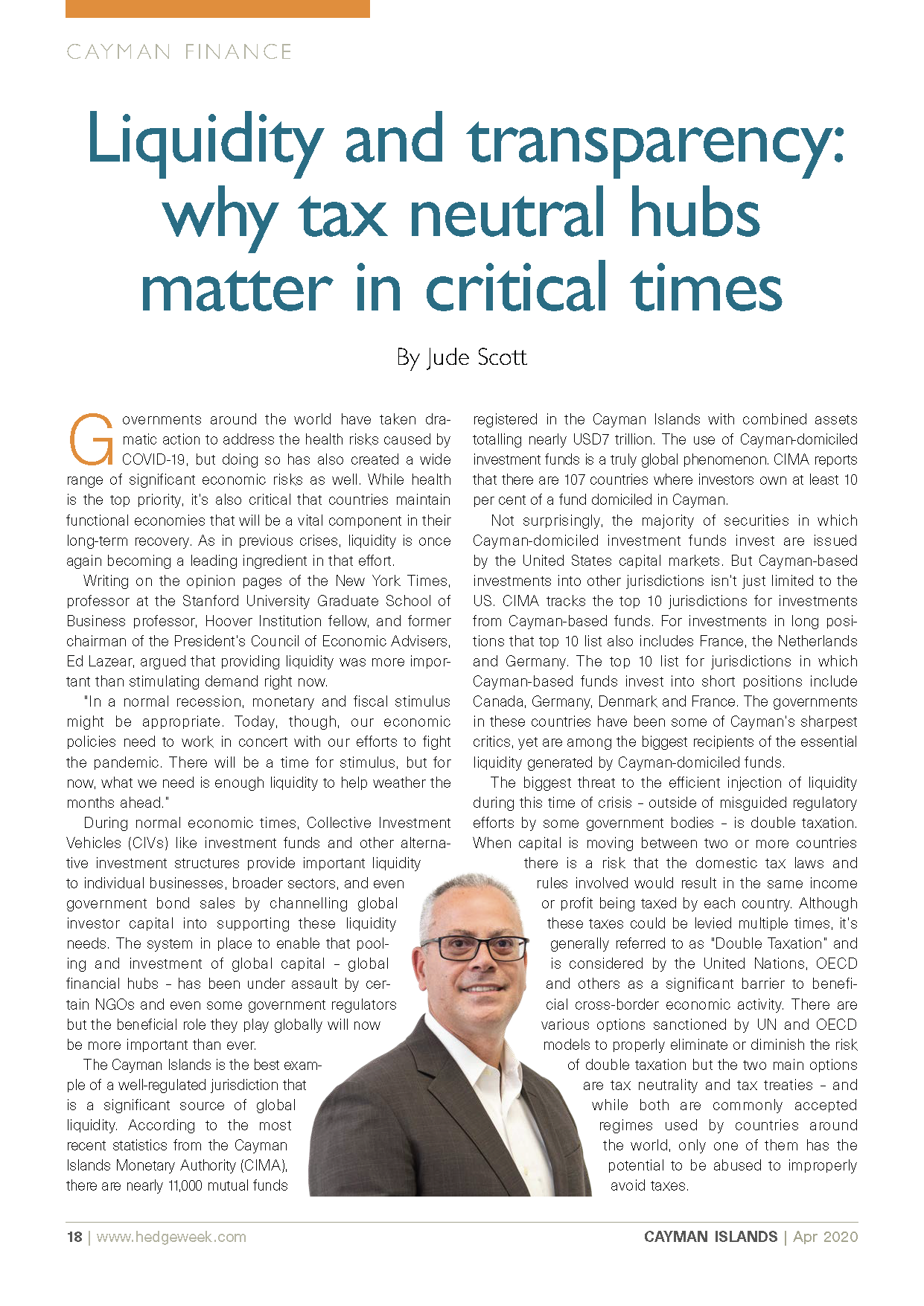
Cayman Finance CEO Steve McIntosh speaking at the IACBE conference for regional business schools hosted by the University College of the Cayman Islands on 22 Nov.
On Friday, 22 Nov, Steve McIntosh, CEO of Cayman Finance, delivered a keynote address at the IACBE conference for regional business schools hosted by the University College of the Cayman Islands (UCCI). McIntosh highlighted the extraordinary contribution of the financial industry to the country’s overall wellbeing but warned that widespread complacency towards the industry presented a serious threat to its continued success.
In his speech, McIntosh reflected on the historical significance of the financial industry in the Cayman Islands, noting the country’s transformation from a small community of subsistence living to a global financial powerhouse in just three generations. He credited the vision of Caymanian pioneers like Sir Vassel Johnson, who laid the foundations for the industry by promoting political stability, robust laws and regulations, reliable air service, and the absence of direct taxation.
However, he warned, the hard work of industry pioneers is at risk of being undone by a growing complacency towards the industry. McIntosh highlighted a concerning trend revealed by a January 2023 survey, which found that almost 60% of the Caymanian public expressed a negative or ambivalent view of the financial industry. He highlighted that the survey was conducted in the wake of the COVID 19 pandemic during which the financial industry had not only propped up the entire economy but also contributed significantly to revenues that allowed the government to support more than 3,000 displaced Caymanian tourism workers with a monthly stipend.
“Cayman Finance is committed to enhancing the success of our members, our clients, and most importantly, our community,” McIntosh stated. “We aim to ensure that every Caymanian willing and able to work in the financial industry has the opportunity to do so.”
He referenced the organisation’s talent development initiatives which included the island’s largest work experience programme known as LEAD, which this year provided 40 Caymanian students with the chance to gain paid work experience with Cayman Finance members.
McIntosh acknowledged the need for Cayman Finance to raise awareness about the benefits of a thriving financial industry and the actions required to sustain its success. “As an industry we must do our part to raise awareness around the benefits for our society in having a thriving financial sector,” he said, adding “but we can’t do it alone”.
Reflecting on the industry’s contribution, McIntosh noted that “the financial industry employs more than 4,000 Caymanians and contributes more than 50% of government revenue, amounting to more than CI$500 million per year.”
“While some might think the greatest threat we face is complying with ever-more burdensome international standards, in fact the greatest challenges to growth are not external, but internal,” McIntosh cautioned. “To retain our position as a leading financial centre, we urgently need to upgrade our operating system, invest in new technology, and allow key government departments, on which the industry depends, to hire more people”.
He underscored the importance of workforce planning and supporting Caymanians who want to work in the sector. “We need to ensure that every Caymanian who is willing and able to work in the industry has the opportunity to do so, but we must also be realistic about the natural limitations of those efforts and allow companies to hire the people they need from overseas when no Caymanians are available.” He cited data provided by the Economics and Statistics Office that showed unemployment among Caymanian graduates at only 2% and a percentage of college-level education among the local workforce that was only slightly lower than in the UK and the US.
McIntosh also highlighted the need for more funding for promotional efforts. “Our government provides CI$1.4 million each year to support promotion of the financial industry. Meanwhile, it spends 14 times that amount — about CI$20 million — promoting the tourism industry, which employs fewer Caymanians and contributes a much smaller proportion of the government’s revenue. “By comparison”, he noted, “Jersey Finance, our counterpart in the Channel Islands, receives CI$7 million in funding from their government.”
McIntosh pointed to a dramatic decline in a key economic indicator and lacklustre growth in financial industry jobs in recent years. “Over the last six years real GDP per capita has consistently fallen — from CI$68,000 in 2017 to only CI$59,000 in 2023 — a reduction of 17% in six years. And while the financial industry’s contribution to government revenue and GDP has doubled since 2009, employment in the sector has barely grown in absolute terms and shrunk as a percentage from around 11% to around 7%.”
He noted significant growth among professional firms that research suggested had been largely offset by a decline in employment among members of other once-prominent sectors like banking and fund administration.
McIntosh attributed the flattening observed in financial services employment to several factors including the cost and difficulty of obtaining work permits, a rising cost of living, and the relative ease with which international companies could hire people in competing locations. He pointed out that jobs were not being lost to low-cost centres but high-cost centres like Toronto, Hong Kong and even Dublin, which he said has the highest cost of living in the EU.
McIntosh said that, had the country chosen to allow it, the industry could have been twice the size it is today, contributing an additional CI$50 million to government revenues from work permits alone. He noted that, in contrast to the large projects seen in tourism and construction, jobs in financial services were created or destroyed one at a time, warning of what he said could eventually become a “death by a thousand paper cuts”.
McIntosh noted that his remarks were not a criticism of the government and praised the “tremendous efforts and accomplishments” of former Minister of Financial Services André Ebanks, as well as the leadership and staff of key government ministries, departments and authorities like the Ministry of Financial Services and Commerce, the General Registry and the Cayman Islands Monetary Authority, whom he described as “the unsung heroes of our industry”. Rather, he described the complacency towards the industry as “practically a matter of national consensus,” highlighting that the government would not support the industry unless the Caymanian people did.


